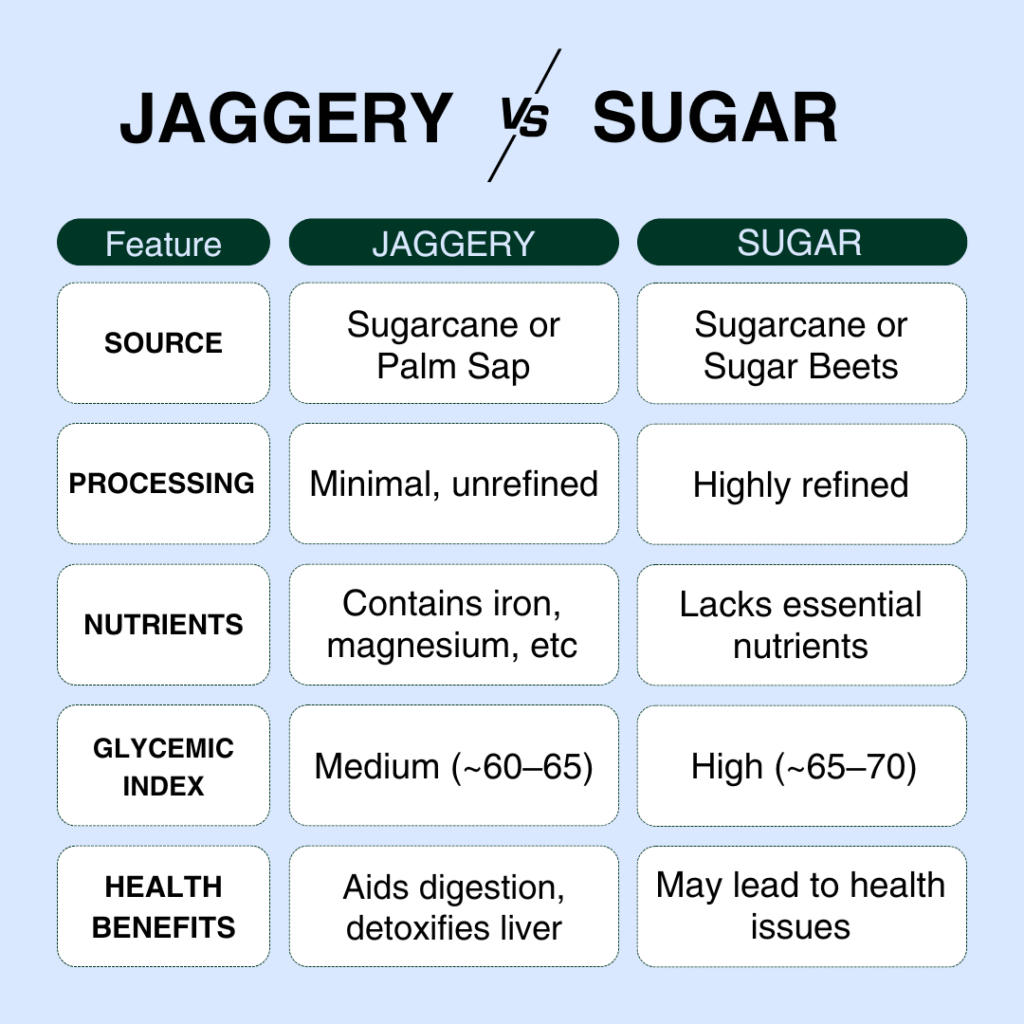Sugar is a common sweetener found in many of the foods and beverages we consume daily. However, as awareness about nutrition and health continues to grow, more people are beginning to reconsider their sugar intake. Refined sugar, which is highly processed, provides only empty calories and has been linked to various health issues such as weight gain, diabetes, and heart disease when consumed in excess. In contrast, jaggery, a traditional and natural sweetener, is emerging as a popular alternative. Producers make jaggery from concentrated sugarcane juice or palm sap without using chemicals, allowing it to retain essential minerals like iron, magnesium, and potassium—minerals that the refining process of white sugar removes. Many people believe jaggery aids digestion, boosts immunity, and provides longer-lasting energy. However, since it is still a form of sugar, you should consume it in moderation. Although jaggery isn’t a miracle health food, most consider it a slightly healthier option than refined sugar, especially when it’s unrefined and organic.

Table of Contents
- What is Jaggery?
- Types of Jaggery
- 7 Amazing Health Benefits of Jaggery
- Jaggery vs. Sugar: Which One Is Healthier?
- Basic Comparison Table: Jaggery vs. Sugar
- FAQs: Jaggery vs. Sugar
- Conclusion
What is Jaggery?
Producers make jaggery, a natural, unprocessed sweetener, by boiling sugarcane juice or palm sap until it solidifies into blocks or powder. People across South Asia, Africa, and certain regions of Latin America commonly use it. In India, they know it as gur. Unlike white sugar, which undergoes a chemical refining process, jaggery retains natural molasses, giving it a richer color, texture, and flavor.
The lack of heavy processing means jaggery preserves many micronutrients, making it a more wholesome option. It is commonly used in sweets, teas, and herbal concoctions, and also plays a significant role in traditional medicine systems like Ayurveda.
Types of Jaggery
Jaggery comes in various forms depending on its source and preparation:
1. Sugarcane Jaggery
This variety, made from sugarcane juice, has a golden-brown hue and is widely used in Indian cuisine
2. Palm Jaggery
Made from the sap of palm trees, this type is darker and has a more complex, earthy flavor. It is regarded as more nutritious compared to sugarcane jaggery.
3. Coconut Jaggery
Derived from coconut palm sap, it has a subtle sweetness and is popular in South Indian and Southeast Asian cuisine.
7 Amazing Health Benefits of Jaggery

1. Rich in Essential Nutrients
Jaggery contains small amounts of iron, magnesium, potassium, phosphorus, and calcium, unlike white sugar, which is essentially empty calories.
2. Boosts Digestion
Jaggery promotes the release of digestive enzymes and encourages bile production in the liver, aiding in better digestion
3. Natural Detoxifier
It helps cleanse the liver by flushing out harmful toxins from the body, thanks to its antioxidant properties.
4. Improves Respiratory Health
People often ease symptoms of asthma, bronchitis, and other respiratory issues by consuming jaggery with warm water or tea.
5. Prevents Anemia
The iron content in jaggery helps increase hemoglobin levels, making it beneficial for individuals suffering from anemia.
6. Provides Sustained Energy
Your body digests jaggery slowly, releasing energy steadily, unlike sugar, which it quickly absorbs and causes energy spikes and crashes.
7. Strengthens Immunity
With its rich antioxidant content and trace minerals, jaggery helps build a stronger immune system and fights against seasonal illnesses.
Basic Comparison Table: Jaggery vs. Sugar

1. Is jaggery better for weight loss?
While jaggery is more nutritious, it still contains high calories. It can be used in small amounts but is not a weight-loss food.
2. Can jaggery replace sugar in all recipes?
You can use jaggery as a substitute for sugar in most recipes, especially in baking and desserts. It adds a rich flavor and more depth.
3. Does jaggery expire?
Yes. Jaggery can harden or develop mold over time. Store it in a cool, dry place in an airtight container to extend its shelf life.
4. Is organic jaggery better?
Organic jaggery is free from chemicals and additives, making it a safer and healthier option than regular jaggery or sugar.

